#lashing out at fellow fans/writers/actors/you name it...
Explore tagged Tumblr posts
Text
There are certain shippers in certain tags who seem intent on setting themselves up for a fall, and... oh god, I just can't be doing with it. Why can't shipping just be a fun wee bonus, a fun game of "what if?" on the side? Why do some people insist on making it the be-all and end-all of their enjoyment of the actual material, and building up their hopes on whether Character A and Character B kiss or not? (Especially when the source material isn't romance-focused!) The result is always the same, and it's always ugly, and no one ever seems to learn from it. I'm seriously considering blocking certain blogs, which I don't really want to do, because I do like reading some of the shippy meta, but fuck, I just can't be bothered going through this particular rodeo yet again.
Why does it matter if it's canon or not? People, that's why we do fic and art and all that in the first place - to explore the roads not taken in canon.
I'm seeing people saying things about feeling "anxious" about a series finale in case Ship X don't get together, or being "traumatised" because the actors of Ship Y have been saying in interviews, "We love the whole idea of people shipping these two, but we don't know if they're actually going to get together." And if this isn't just glibness, and they are genuinely feeling anxiety and trauma over these things... I'm sorry, but they need to stop. They need to get off the fucking computer and get some help, because it's not healthy to invest that much of your mental health in something that isn't real.
#shipping#fandom wankery#if you follow me you can probably guess what ships I'm talking about#but this is also a general cri de coeur#the sheer number of times I've had to watch people pinning all their enjoyment on a ship#especially one that was patently never going to happen#then melting down all over the place when it inevitably didn't happen#lashing out at fellow fans/writers/actors/you name it...#benafflecksmoking.jpg
166 notes
·
View notes
Text
I think this is an important debate right now so I'm gonna just drop the whole article in here as well:
By John Hoey, April 13, 2020
"Daisy Ridley has been a part of Star Wars for over five years and has seen the best and worst sides of its fans. Now that the sequel trilogy has ended, concluding Rey’s story (for now), the actress shared her take on the constant negativity coming from fans who didn’t like The Rise of Skywalker and the impact it has on those who create the films, as well as her personal etiquette and social media preferences. Ridley’s thoughts on online fan culture make this as good a time as any for us fans to take a reflective look at ourselves and the impact we have on the Star Wars franchise and its future.
In an appearance on the podcast DragCast, Ridley was asked about her personal social media preferences and spoke clearly about why she doesn’t have social media (it’s not as dramatic as some have made it out to be), and her thoughts on the fans who choose to lash out with backlash toward Star Wars films, most recently The Rise of Skywalker.
First it needs to once again be made clear why Daisy Ridley is not publicly on social media:
“I was asked to go on it, and, at the time, I was like, ‘Okay,’ and then it got to the point where I didn’t want to be on it and I was at my friend’s house in L.A., and I remember being like, ‘Oh, I don’t want to be on Instagram,’ and they were like, ‘Well, why don’t you come off?’ and I was like, ‘Oh.’ And it was really a nice, autonomous decision. Because I was like, ‘Oh, I don’t actually have to be on it. This is nice.’ And I always had a limit to what I shared anyway and, honestly, my life isn’t that exciting. So there were a lot of separate things.”
Ridley talks about how things have changed since 2015’s The Force Awakens, which was universally loved for the most part. If you read between her carefully chosen words, she is basically saying social media has brought negativity much more to the surface than it used to be.
“It’s changed film by film, honestly. Like 98%, it’s so amazing. This last film, it was really tricky. January was not that nice. It was weird, I felt like all of this love that we’d sort of been shown the first time around, I was like ‘Where’s the love gone?’ I watched the documentary, the making-of, this week, and it’s so filled with love, and I think it’s that tricky thing of when you���re part of something that is so filled with love and then people. You know, everyone’s entitled to not like something, but it just, it feels like it’s changed slightly, but I think in general that’s because social media and what have you.”
Ridley takes to the popular lesson parents everywhere try to teach their kids, “If you have nothing nice to say, don’t say anything at all.” Well, that doesn’t play in fandoms, of any kind. Daisy admits to finding the backlash to The Rise of Skywalker upsetting, and how she tries to avoid it as much as possible, while acknowledging how easy it is for people to have an outlet, in turn leading to more opinions reaching the public sphere.
“I think in general, people share so much on social media that if I went—I don’t have social media, anyway—but if I went to a film and didn’t like it, I just wouldn’t tweet about it,” she continued. “But it’s such a conversation and it always has been. I guess now conversations are just more public, so there’s stuff I wouldn’t have seen, but honestly trying to scroll through my newsfeed in January and trying not to see Star Wars stuff, I’d see headlines and be like ‘Oh my god this is so upsetting.’ So it’s been tricky, but then it’s having that thing of I feel really proud of it, and I’m so thrilled to be part of it. Yeah, but it’s a funny thing.”
I think a big part of the allure to posting our takes into the endless reaches of social media is people want to be heard and feel relevant. There is an inherent human instinct to want validation, and if your thoughts on something get showered with likes and retweets and comments, that validation is fed. But, if our output is negative it can snowball into a sub-culture that has a significant impact. I have had conversations with plenty of people over the years in the film industry and even inside Lucasfilm who have said they pay attention to what’s going on on social media. Now I say that with hesitation as that could entice people to be more vocal, but the point is, they keep tabs on who says what, especially those who are legitimate influencers in the community. They pay attention more than you realize.
The downside of this is creators and talent are also very aware, and for some it has become unattractive to want to work on Star Wars after seeing the hell and hate George Lucas, J.J. Abrams, Rian Johnson, and other creatives have gone through. Perhaps that’s why we’re scratching our heads lately at some of the unknown names we’re seeing popping up as writers and other significant crew members on important upcoming projects. The editor of Del Rey books Tom Hoeler publicly admitted it is hard finding authors to write Star Wars books, which is under a much, much dimmer spotlight than writers, directors, and actors.
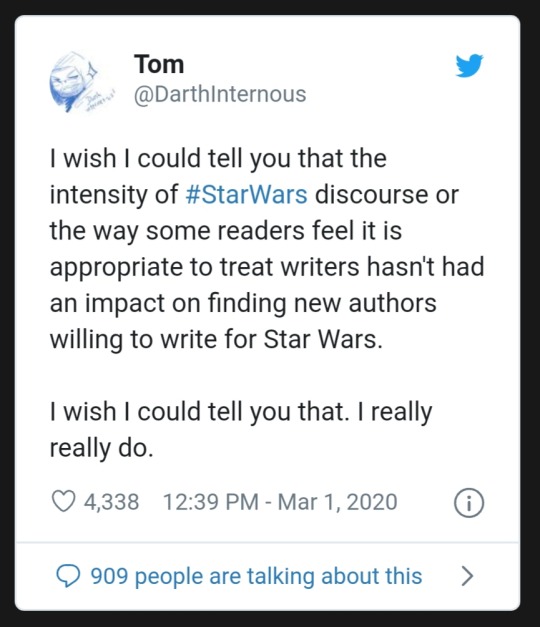
The more Star Wars “fans” poison the well of social media with negativity, backlash, and hate toward the films and those who make them, the harder it will be for Lucasfilm to convince talented people to want to work on projects from a galaxy far, far away, when they can just as easily take their talents to less murky waters.
There are varying degrees as well as extremes of negativity online, and the biggest extreme are those who threaten violence against creators. Now some will say this is just a joke, but I can’t imagine how anyone would find something like this humorous, especially in today’s world.
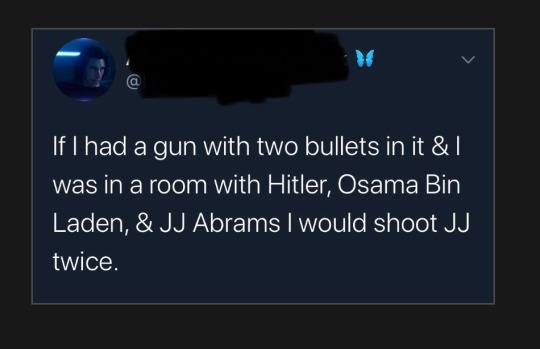
Now many will rebut by saying that type of behavior is not representative of all who didn’t like the movie, and that is completely true. That goes without saying. But, as with what happened with The Last Jedi, where hate toward the movie and Rian Johnson permeated for years after the movie’s release (continuing to this day), perpetual and constant output of negativity, even if done without hostility, fosters and ferments the culture of hate. As Daisy Ridley said, everyone has a right to not like something, but I am not sure what good it does if you voice that disdain and/or hate non-stop. If you left the theater after seeing The Rise of Skywalker and took to your Twitter account to tell your followers you hated the movie, that’s all well and good. Did you take the next couple of weeks to point out things you didn’t like about it? That makes sense. Your message was likely received. But if you feel a need to constantly beat the same drum of negativity over and over five months later and into the future, perhaps you need to rethink your approach if you believe your thoughts haven’t been clear or resonated with people.
I am personally not a big fan of The Clone Wars or Ahsoka Tano, but instead of bashing Dave Filoni or the animation department on a daily basis, I opt to talk about things I like instead. I catch myself taking a turn to negative town from time to time, we all have our moments, but I think if we care about Star Wars and want it to succeed and attract the best filmmakers and talent possible, perhaps it’s our responsibility as fans to be better and create a better online culture together. Not all fans pay attention to the pulse of fans online, but it’s a growing part of all fandoms, not a shrinking one, so I hope we can all channel our inner Jedi and be more polite, respectful, and kind to creatives and each other on social media and in general.
This culture of negativity is not limited to Star Wars, as other movie and TV franchises, sports, music, and anything with mass followings suffer from similar problems. I still believe Star Wars fans are overall good, and while sometimes we feel smothered by the spread of negative vibes when we try to connect with our fellow fans online, we need to always try to remember one thing about the good people in this fandom…there are more of us."
#daisy ridley#the rise of skywalker#star wars#fandom discourse#tros negativity#star wars negativity#fandom negativity#anti tros#rian johnson#jj abrams#star wars fandom#sw discourse#tros backlash#rey
1 note
·
View note
Text
Why you should be watching Babylon 5
With all the streaming services that are out and about today, it can sometimes be hard to find which ones are slinging the best ‘tent around (that’s content to you plebs). There’s the big players in the game: Netflix, Hulu and Amazon, but lets not forget the mini-bosses in this game of views. Services like: Vue, Sling, Crackle, Twitch, Vevo, Shimmy, Wrangle and Flurp. There are so many out there that I bet you didn’t even realize the last three I mentioned aren’t even real services.
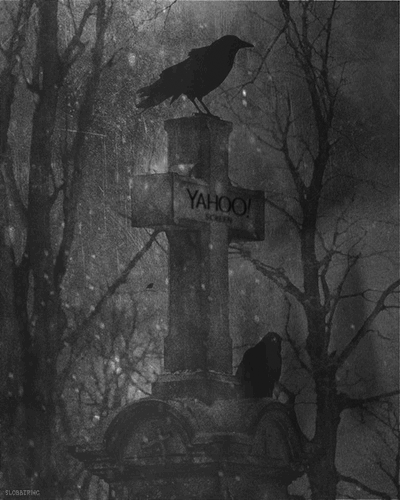
I mean, Yahoo! Screen? Who you trying to kid with that fake news?
Recently while clicking ‘round the wonderful world of Reddit, I noticed I kept seeing an ad at the top of my screen saying that I could stream all of Babylon 5 for free. I shrugged it off as nonsense, some click bait-y type website that would make me read and click through 35 images smothered with ads talking about “What do the People of B5 look like Now?!”

#4 will shock you!
But then, thanks to Big Brother and his tasty cookies, I started seeing the ad more and more on different pages I went to: Reddit, Yahoo! (sorry Screen), Latino-Review, PornHub, xHamster, FistMeisters and Club Penguin. So I decided to take a peek at what this was. Thus I was introduced to a new player in the game: go90.com

I love you.
Sure enough, for free, I could sign up for an account and watch the entirety of Babylon 5 (five seasons) and only have to deal with one 15 second ad before every episode. I couldn’t believe it. ‘Why is this important?’ you ask. Well I will tell you make believe reader.
Babylon 5 is the fucking best sci-fi show of all time.

Come at me Farscape! (but for realzies Farscape is awesome too...)
‘What is Babylon 5?’ you ask again voice in my head. Here’s the Wiki: “Set between the years 2257 and 2262, it depicts a future where Earth has sovereign states, and a unifying Earth government. Colonies within the solar system, and beyond, make up the Earth Alliance, and contact has been made with other spacefaring species. The ensemble cast portray alien ambassadorial staff and humans assigned to the 5-mile-long Babylon 5 space station, a center for trade and diplomacy.”
Sounds complicated and convoluted? You bet your sweet ass it is. J Michael Straczynski (further to be known as JMS because I do NOT feel like typing his last name out 300 times), created this show because he wanted to take an adult approach to science fiction story telling. He has been quoted as saying that he wanted “to take an adult approach to SF, and attempt to do for television SF what Hill Street Blues did for cop shows."
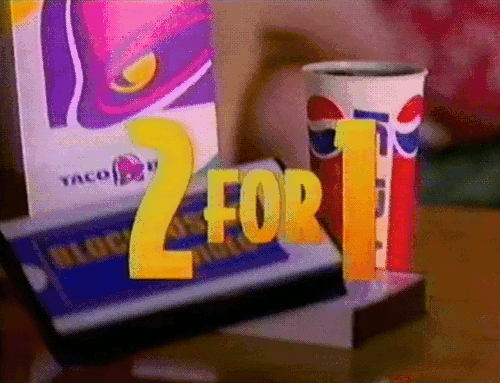
If you think that sentence doesn’t sounds old, then I have a Blockbuster franchise I wanna sell you.
The show mainly focuses around five dominant races/species/civilizations: the Humans, the Minbari, the Narn, the Centuri and the Vorlons). Through the wonders of makeup, costuming and practical effects, these races look, act and feel VASTLY different from each other, despite the fact they are all bi-pedal humanoid type creatures. During the series Babylon 5 goes through many plot lines, all interweaving and intersecting at critical and crucial points that make you slap your head and wonder how the hell they pulled it off. Well the answer is simple, and point number one on my multiple bullet breakdown on why this show rocks.

Who’s ready for bullets and notes, you nerds?!
1) JMS, the creator, wrote 92 of the 110 episodes of the series
Think about that for a second. Almost 84% of the entirety of the series was written by one man, which includes the entirety of the 3rd and 4th seasons (the 3rd being arguably one of the best seasons). A feat, JMS would tout, that had never before accomplished in American Television. Why is this a big deal? Well when you have one singular vision you can expect the unexpected and plan for contingencies you never saw coming. What do you mean by that? Well…
2) Every Character was written with a “trap-door”
Pulled directly from Wiki (because I’m hungover and being a lazy writer for the moment): “Though conceived as a whole, it was necessary to adjust the plot line to accommodate external influences. Each of the characters in the series was written with a ‘trap door’ into their background so that, in the event of an actor's unexpected departure from the series, the character could be written out with minimal impact on the storyline.”
In the words of Straczynski, “As a writer, doing a long-term story, it'd be dangerous and short-sighted for me to construct the story without trap doors for every single character. ... That was one of the big risks going into a long-term storyline which I considered long in advance…” I can’t think of another series that has done this. Contract disputes? Check. Actors dying? Check. Budgetary constraints. Check. All bases covered by this one simple act of having the entire story thought out, conceived, shepherded and written by one man.
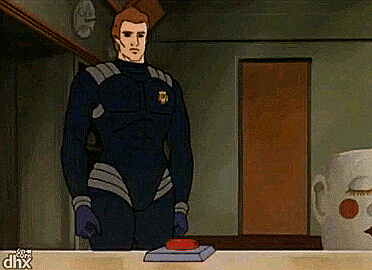
Getting rid of unwanted minions? Check.
Why is this “trap-door” thing important? Take the case of Michael O’Hare who played Commander Jeffery Sinclair in the first Season of B5. During the first season O’Hare started having paranoid delusions and hallucinations. As the show continued they worsened, causing him to be difficult to work with O’Hare lashing out at fellow colleagues. JMS offered to suspend the show for several months while he helped him seek treatment, but O’Hare declined because he didn’t want to jeopardize the series or other people’s jobs. He agreed to finish the first season and be written off the show so he could seek treatment. The treatments were only partially successful, but it allowed Sinclair to make a few cameo appearances in Seasons 2 and 3 to finish out his arc properly. After all was said and done, JMS swore to keep O’Hare’s secret to the grave, to which O’Hare replied "keep the secret to my grave", pointing out that fans deserved to eventually learn the real reason for his departure, and that his experience could raise awareness and understanding for people suffering from mental illness. O’Hare suffered a heart attack in NYC in September of 2012, and true to his word, eight months later at Phoenix ComicCon JMS told the story of his late friend and colleague.

My good…dear friend JMS
3) Visual Pioneer
Most Sci fi shows (and movies for that matter) at the time relied HEAVILY on practical effects. B5 did not when it came to space-time-fun. In order to make the budget stretch, JMS and other producers developed their own in house effects company. This show came out in 1993, the same time Jurassic Park did.
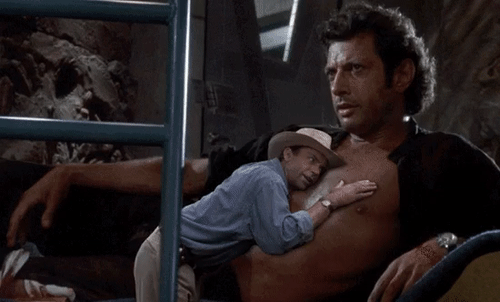
I mean, look at how realistic Goldbulm looks.
Now, while the graphics haven’t aged as gracefully as Jurassic Park did, they also had $100,000 workstations and several years to work on those dino-fects (which total about 6 minutes of the movie) where B5 had $5,000 stations to work on each week, with space scenes taking up a good 33% of the episodes. On top of that, B5 was not filmed in 4:3 aspect ratio like a majority of TV was. It was shot in 16:9 and cropped to fit, which is why today some of the effects haven’t aged really well, but I forgive them.
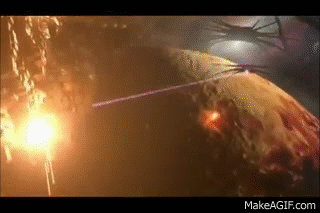
ZOMG LAZERS PEW PEW
B5 and the effects house Foundation Imaging, also heavily influenced sci-fi TV shows to come after. Star Trek, most notably, were reluctant to use CGI in their TV shows, until B5 showed them that it could be done, and done well. This change happened when the series premiered on television in January 1993, conclusively proving that computer animation, most notably CGI, could be employed in creating spectacular believable VFX on a tight budget. And despite themselves, this was not entirely lost at the time on the Star Trek producers.
David Livingston commented on the use of early CGI in creating the Bajoran lightship for Deep Space Nine: "We were reluctant to do computer graphics, but Peter Lauritson finally came around. He recognized how valuable it is. You can do more stuff with the ship, but you have to do it right.”
Speaking of Deep Space 9, there is a little bit of controversy there. You see, Paramount Television was aware of JMS’ show B5 as early as 1989. JMS attempted to sell the show to Paramount and provided them the series bible, pilot script, artwork, character backgrounds and histories and plot synopsis for the first season or 22 episodes. Paramount declined to produce B5, but then announced Deep Space 9 would be in development two months after Warner Bros. announced that they were produced B5. For those of you not in the know, Star Trek: Deep Space 9 was a notable Star Trek show for one very important reason: it doesn’t take place on a starship…but on a space station. Controlled by the United Federation of Planets (or as B5 had it…the League of Non-Aligned Worlds). There are more “coincidental similarities” but I’ll let JMS say it better than I can in his response to a DS9 fan who took JMS and Warner Bros’ lack of legal action as proof they had no case:
"If there is any (to use your term) winking and nudging going on, it's on the level of 'Okay, YOU (Paramount) know what happened, and *I* know what happened, but let's try to be grownup about it for now,' though I must say that the shapechanging thing nearly tipped me back over the edge again. If there are no more major similarities that crop up in the next few weeks or months, with luck we can continue that way."

Suck it you Ferengei Bastard
4) The Characters
The characters have SO MUCH depth. Without giving up any spoilys, the two biggest arcs in the show belong to G’Kar of the Narn and Londo Mollari of the Centauri. Played with ferocity and earnest by Andreas Katsulas (the one armed man from President Ford’s version of The Fugitive) and Peter Juraik respectively, these two characters go through some of the biggest, hardest and thickest most emotional arcs in the whole show. The Narn and the Centuri have been at war for over 100 years, and they well…hate each other. But every time you think things can come to a peaceful resolution, something happens to reset things back to zero. Both characters (thanks to the wonderful acting by their um…actors) make you feel their despair, pain, struggle, anger and anguish with every line spoken. Every character had a deep backstory and makes you feel for them. Ivanova and her hatred for Psi-Corp. Girabaldi and his alcoholism. Dr. Franklin’s addiction to stims. So on, and so forth.

Something about bad hair and awful decisions...
5) Awards
The show was nominated for eight Emmy Awards, and winning two, including Outstanding Cinematography, Makeup and Hairstyling for a series. It also won two Hugo Awards (basically the Emmys/Oscars of science fiction and fantasy); two Space Frontier Foundation Awards; an E Pluribus Unum Award presented by the American Cinema Association and a Saturn award for Best Syndicated/Cable Television Series. That’s a lot of ceremonies to attend.
So that’s my pitch. I have owned all 5 seasons of Babylon 5 on DVD for quite some time, but it’s always been a hassle to have to break out the Blu-Ray player, find the right HDMI input, etc., when you can just stream almost anything anywhere. So now that I have this option, I have been binging it, much to my delight. So much so that I have been missing out on current seasons of shows I’ve watched for years like House of Cards & Orange is the New Black, and also not even bothering to start shows like The Expanse or The OA.
There is so much to love with this series. There are even multiple movie spinoffs that, while not necessary to view when watching the show, just add even more depth and stories to the universe.
I can’t wait to finish this series for the umpteenth time so I can just start it over again.
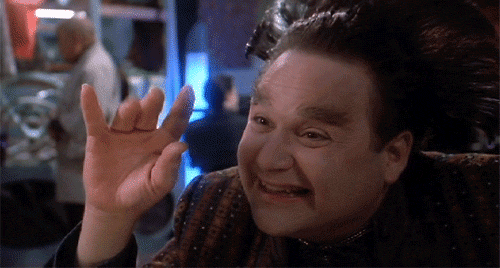
—written by Tony Patryn | @patrynize on Instagram, Twitter and Facebook | www.patrynize.com
#babylon 5#narn#minbari#centauri#vorlon#babylon5#tv#scifi#sci-fi & fantasy#review#gifs#tv reviews#my good dear friend girabaldi
48 notes
·
View notes
Text
How Batwoman Takes on Policing and Social Issues
https://ift.tt/31NtgS3
Police brutality has gone from a niche concern – one most white people considered impolite to bring up at dinner parties – to a compulsory national conversation. It’s long overdue, which has left many playing catch-up, especially white folks and popular media. As David Dennis Jr. pointed out in his excellent Twitter thread (seriously, go read it!) superhero shows have an especially tall order, given that they rely on portraying lawlessness and a fictionalized criminality that the hero can then clamp down on. But that image is out of touch with reality and can send damaging messages.
We’ve long discussed this problematic aspect of the genre in our reviews and features, whether it’s Barry Allen’s personal private prison kept in the basement of STAR Labs or Oliver Queen’s incredibly short-lived interest in reforming the prison industrial complex…before he went right back to adding more people to it. But Batwoman has taken a different tack that other comic book shows could learn from.
Batwoman has, to greater and lesser degrees, explored gentrification, corruption of police and the legal system, police brutality/the lawlessness of privatized law enforcement, and the wrongful conviction of a Black man. The show is not perfect, and it must be stated that no other show is doing quite what HBO’s Watchmen did in terms of exploring this country’s legacy of race, anti-Black violence, and policing. But Batwoman is a superhero show that spent the last year actively engaging with questions like “was that an appropriate use of force?” and “isn’t this a gross violation of the civil rights of the people of Gotham City?”
In the Gotham of Batwoman, a private security firm called The Crows operates with near-impunity within the city, keeping the incredibly well-heeled secure while everyone else hopes for the best. Gated community is an understatement, and frankly, the firm is closer to a mercenary paramilitary operation.
By the end of the season, The Crows have expanded their reach through an app that’s available to all Gothamites, even those who aren’t clients, so anyone can call in the mercenaries if they see big bad Alice and her brother Mouse, or Batwoman, whom Crows head honcho Jake Kane views as equally villainous. It’s easy to imagine the Crows’ app going the way of SketchFactor in DC and other IRL safety apps, which quickly turned into racial and socioeconomic maps, with white and upper class folks flagging anything that made them uncomfortable – namely, Black neighborhoods.
Read more
TV
Replacing Kate Kane on Batwoman Season 2 is a Terrible Idea
By Lacy Baugher
Sophie Moore, a high-ranking agent with the Crows, continually pushes back against their use of force and in several circumstances when the Crows overstep the rights of citizens, to the point where she is sidelined, suspended, and eventually kicked off the Crows. She questions her mentor Jacob Kane in his vendetta against Batwoman – for whom there is no arrest warrant, the shoot-to-kill order on Alice that comes and goes throughout the season, and the extreme blanket use of surveillance on average citizens. If you’re worried about police breaking the law or the militarization of the police, try the privatization of a police force on for size. While the writing on Batwoman clearly raises concerns throughout the season, Sophie and Kate are among the only people able to effectively check the Crows’ power, largely due to their personal and professional relationships with Jake Kane.
One of the show’s greatest assets has been the willingness of its writing and its hero to give the supposed villain of any given episode – who is often disenfranchised in some way that turns out to be connected to how they have lashed out at the system – the benefit of the doubt. It’s a benefit that our legal system is based on, but one that we know many people do not get – and one that the Crows don’t often give to suspects. Some so-called villains have turned out to be innocent people manipulated by others, or victims of systems that eroded their humanity.
For example, the season finale deconstructed the media and law enforcement trope of the giant invincible Black man, using the show’s own gossip host (voiced with juicy irony by longtime Batwoman comic fan Rachel Maddow) to introduce a suspect with barely-coded language. The show goes on to deconstruct that narrative, introducing the audience to his brother, who worries about his sibling who was nothing like the man described on TV. Gotham’s professional football league used him for entertainment and several people in positions of power abused their privilege to do serious harm, in this case irreparable CTE that turned a gentle man into someone who literally couldn’t feel pain, yet another harmful stereotype of Black folks that has caused harm from slavery to the medical field.
Gotham’s actual police force is so incompetent as to be a non-factor. They only come up in maybe a handful of episodes, but they feature prominently in one of the season’s best arcs: the wrongful conviction for Lucius Fox’s murder. His father’s murder was a defining moment in Luke Fox’s life.
Normally the calm, logical, emotionally removed man behind the comms and tech on Team Bat, we watched Luke put together the pieces and realize that a fellow Black man had been set up to take the fall for his father’s death and then pursue the real killer. This wasn’t a clunky after school special one-and-done story so the creators can check a box. The arc was allowed to breathe over many episodes, giving actor Camrus Johnson the space to show the complex and often-changing swirl of emotions his character was experiencing.
Read more
TV
Batwoman Showrunner Addresses Kate Kane Season 2 Departure
By Kayti Burt
Nothing about the writing or the performance was straightforward or easy. It’s the kind of ambitious writing and gnarled injustice that real people actually face, the sort of thing that we actually need real heroes for. It was a high point of Camrus Johnson’s excellent, season-long performance.
It’s worth noting that simply having the male lead – number two on the call sheet, Batwoman’s professional other half – played by a Black man, makes a big difference. But while other Arrowverse shows have had prominent Black characters – John Diggle on Arrow and Iris and Joe West on The Flash come to mind – Batwoman is different. For one, the writing has made explicit that Luke and Kate are partners, whereas for all that he came to eventually love and respect them, Oliver fought Diggle and Felicity every step of the way, and The Flash has always felt like a lead singer with a backing band. Even then, there’s a hierarchy, and a quick spin around the internet will produce ample evidence that neither Iris West-Allen nor Candice Patton have received the kind of treatment that a show’s leading lady would normally expect.
At the root of this is the writers’ room. Batwoman is written by a diverse group of people that represents the issues discussed on the show. It includes queer folks, women, and BIPOC. Actors can do their best to convey the work with skill, sensitivity, and depth. But talent behind the scenes needs to be diverse as well, otherwise they’re still going to be talking about Grandma Esther’s noodles.
While there’s a lot we don’t know about Batwoman season 2, namely the LGBTQ actor who will play the new lead and how they will be written in to pick up the threads from last season, I hope Batwoman will continue working with “villains” who are more complicated than we’re used to seeing on shows with tights.
I also hope they’re able to portray more of the income inequality that showrunner Caroline Dries discussed in an interview with Den of Geek earlier this season. “One thing we had in Gotham City is this idea of the ‘us-versus-them’ in the districts where people are protected and then other districts where they’re left to their own devices because they can’t afford private security.”
Dries told us that, unfortunately, this wasn’t as emphasized as she would have liked, due to the limitations as production.
“In a perfect world, you’d have a bird’s eye view of the city and you would actually be able to see districts,” Dries said. There were some references to this earlier in the season with checkpoints between neighborhoods, but as the season went on, Dries said those little bridge scenes were the first to get cut due to time and money. Fortunately, it sounds like it will still be part of season 2, and likely more pronounced.
“If I had all the time in the world and all the money in the world, I would have been able to dramatize that disparity better and the segregation a little bit better, visually,” Dries said. “But we’re going to continue to keep that alive, especially now as we’ve seen the Crows sort of becoming more heightened in their power and becoming more authoritarian and scarier.”
Read more
Movies
DC FanDome to Reveal DCEU, Arrowverse, and More DC Universe Secrets
By Jim Dandy
Moreover, homelessness has been part of the show’s narrative since the very first teaser, but Batwoman has yet to engage with the issue of economic inequality or with actual people experiencing homelessness as individuals, rather than as an abstract concept. Even if it’s simply by having Mary, Luke, or the mysterious “Ryan Wilder” develop a relationship with someone who sleeps rough outside Wayne Tower or their apartment building, or if Mary’s clinic starts back up again and a character or two is differentiated that way, it would be nice to see humanity and individualism, rather than a monolith.
Finally, while it’s not an issue involving our carceral systems, it must be said that Batwoman has provided the space for Meagan Tandy’s Sophie to have a truly lovely storyline about her sexuality. While Kate Kane/Batwoman has basically always been out and accepted, that’s not everyone’s story. Not everyone has accepting parents and a family fortune to fall back on if they’re kicked out of the military. Sophie’s journey as a queer Black woman has been allowed to progress at her own pace, allowing the character to unpack what it means for her relationship (she starts the series married to a man), her identity, and her family as she explores who she is and what that means to her. Not everyone’s path is the same, nor do they have to express it the same way. While it’s great for people to see Kate Kane as a role model, I imagine there are far more people who can relate to Sophie Moore.
As television reorients itself around a long overdue reprioritization of Black lives, the landscape will shift, in some cases dramatically, as with the cancellation of long-running show Cops. But for other shows, like Batwoman, there’s an opportunity to continue pushing even further forward on the very social issues that once caused trolls to review-bomb the show with so much online hate. Heading into season 2, as the social and cultural landscape shifts, Batwoman should continue Kate Kane’s legacy of fighting injustice intersectionally, centering the marginalized while upending comic book tropes about law and order.
The post How Batwoman Takes on Policing and Social Issues appeared first on Den of Geek.
from Den of Geek https://ift.tt/2Z09TUa
0 notes